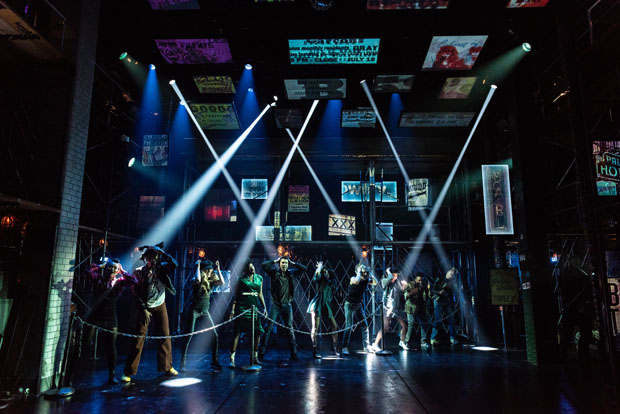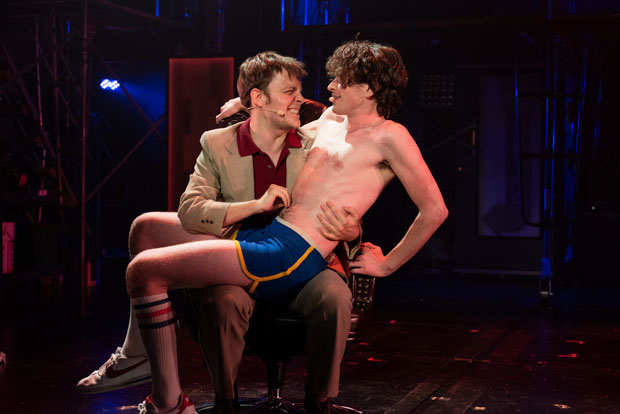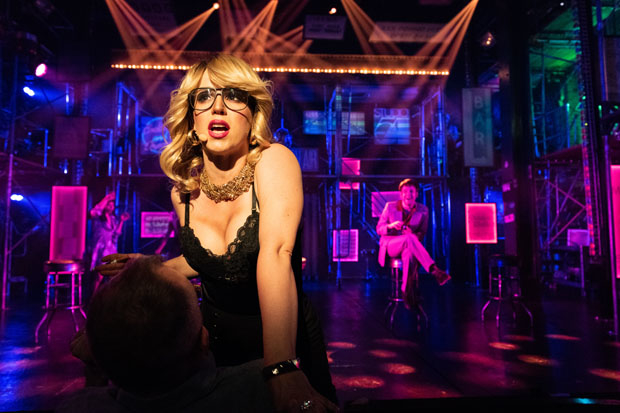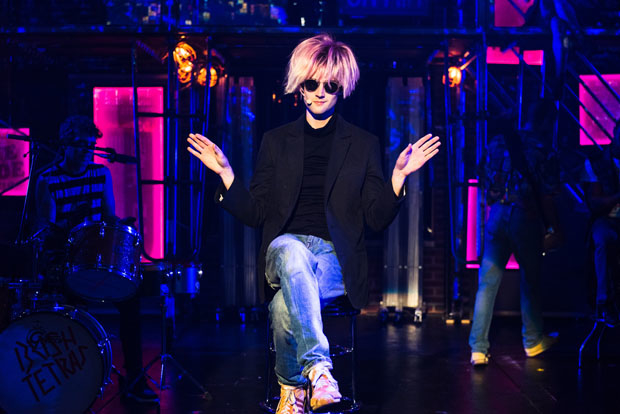The Dancing Denizens of Studio 54 Insist This Ain't No Disco
A new musical attempts to capture the spirit of New York City in the late ’70s.

(© Ben Arons Photography)
The glitterati conspire, the go-go boys twirl, and line-dwellers plead in the opening sequence of This Ain't No Disco, the hot mess of a musical now playing at Atlantic Theater Company. This nostalgia trip back to the New York City club scene of the late '70s features music, lyrics, and book by Peter Yanowitz and Stephen Trask (Hedwig and the Angry Inch), with additional book material by Rick Elice (Jersey Boys). As manically unfocused as a club queen on a coke bender, it is at once thematically overstuffed and emotionally barren.
Subtitled "A Rock Opera," the show seems to want to replicate the kind of unrelenting momentum of sung-through musicals like Les Misérables and Rent (a show This Ain't No Disco particularly resembles in its glorification of New York at its worst). In the first 10 minutes, we're bombarded by a dizzying array of characters, plots, and melodies: There's Sammy (Samantha Marie Ware), a punk rocker from Queens who inexplicably wants to get into exclusive uptown disco Studio 54. That's the domain of lecherous proprietor Steve Rubell (Theo Stockman). Graffiti artist and occasional hustler Chad (Peter Laprade) works there alongside coat-checking lesbian sculptresses Landa (Lulu Fall) and Meesh (Krystina Alabado). Like Greek gods pursuing their petty rivalries in rhyming couplets, The Artist (Will Connolly in a Ricky's Andy Warhol wig) and celebrity publicist Binky (Chilina Kennedy) choose which of these young hopefuls to aid or undermine in their quest for immortality. Meanwhile, this disco Olympus is threatened with destruction by an ambitious district attorney (Eddie Cooper, cutting a far more flamboyant figure than Robert Morgenthau ever did).

(© Ben Arons Photography)
A rudimentary knowledge of nightlife history will clue you in to the fact that some of these characters are real and some are not. That is, of course, if you can hear any of it. I caught about 25 percent of the exposition thanks to Emily Lazar's severely imbalanced sound design, which regularly leaves the vocalists drowning in percussion. Granted, with lyrics like, "Glory glory / Let us through the / Door-e glory," I'm not sure I missed much.
Like DJs at an all-night dance party, Trask and Yanowitz give us plenty of driving melodies that get our toes tapping for a minute or two before ceding ground to the next track. By the end of the evening, we're hard-pressed to remember any of them. The same could be said of the scattered book, which takes on prostitution, drug use, self-harm, sexual abuse, and trans issues (among other topics). Without sufficient room to properly develop, these themes wilt like orchids locked away in a darkened VIP lounge.

(© Ben Arons Photography)
Darko Tresnjak's erratic production doesn't do much to focus our attention. Ben Stanton's flashy lighting delivers discotheque authenticity, while Sarah Laux's predictable costumes put the lame in gold lamé. Aaron Rhyne's superfluous projections of brick walls and porn marquees seem meant to recall the New York of yesteryear, but they're not as successful at evoking the gritty city as Jason Sherwood's wrap-around scaffold set. While providing multiple levels for staging, it often seems to crowd Camille A. Brown's adequately festive choreography. Even worse is when Tresnjak misjudges the sight lines in the theater, like when Alabado is forced to sing a heartfelt confessional ballad from the highest point on the set, with her head nearly in the lighting plot. In lieu of precise direction, the cast reverts to clichéd sensationalism: They snort fake cocaine and molest the front row of the audience. But it's about as edgy as a pair of safety scissors.
There are a couple of stand-out performances: Majestically strung-out as Rubell, Stockman consistently dazzles as the twitchy, sweaty angel atop this busted Christmas tree. Through sheer charisma, Kennedy actually sells Binky's terrible second act comeback song, a number complete with rhyming dictionary lyrics like, "I just push reset / It's me you won't forget / Not one single regret / I need a cigarette / Oh look, a clarinet." (Yes, she actually plays the clarinet at this moment.) The name of the song is "I'm Not Done Yet," which comes off as more of a threat than a promise at hour two.

(© Ben Arons Photography)
There's one great song and it's given to The Artist as an 11 o'clock number. It has very little to do with anything we've just watched, but Connolly knocks it out of the park like he's Bono at Madison Square Garden. "Life is suffering, life is pain," he wails. After two hours and 30 minutes of This Ain't No Disco, no lyric has felt truer.









